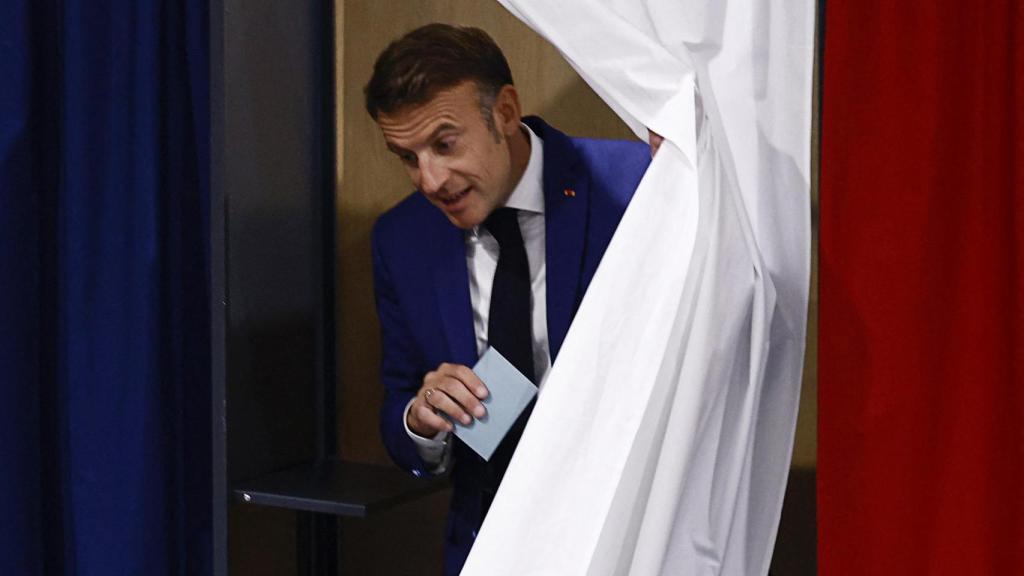Joy. Vertigo. Uncertainty. Mess. Jubilation on the far right. Vertigo in power. Uncertainty due to the high number of triangular candidates for the second round and confusion on the left and the (until now) presidential majority. The French voted this Sunday, en masse, to elect deputies in the Assembly in the first round of early legislative elections called by President Emmanuel Macron.
And as the polls anticipated, The extreme right is on the verge of power. His victory is incontestable: more than a third of the votes supported candidates from the National Reunion (RN). But the High participation (67%) This meant that in the second round, to be held next Sunday, there could be around 300 triangular matches.
The exact number will not be known until Tuesday, when the deadline for candidates to stay or withdraw ends. The two most voted in the first round pass and the third if their votes exceed 12.5% of registered voters. With turnouts as low as in 2017 and 2022, when abstention exceeded 50%, they were rare: one in 2017 and eight in 2022.
With a participation never seen since 1997, the triangular record has been broken. That year the elections were also the result of an early dissolution. So for the Gaullist Jacques Chirac. And it was a failure because the plural left headed by the socialist Lionel Jospin won.
It was the last time there was a cohabitation government between a president and a prime minister of different political affiliations. After three years of cohabitation, Chirac was re-elected again but a constitutional reform shortened the presidential term from seven to five years. The electoral cycles – presidential and legislative, also five years – were coupled and there was no cohabitation again.
Until today. Macron seems destined to cohabit with Jordan Bardella, the young president of the RN appointed to the position of prime minister. This Sunday he appeared at 8:30 p.m. In Paris, in front of more than 300 journalists, without militancy. No questions. An institutional declaration. Very institutional. Without stridency. He has said that he will not be prime minister if he does not obtain an absolute majority, that is, 289 deputies. The projections on Sunday night place the harvest of minutes from RN and its allies on the classic right (LR) between 240 and 270 minutes (IFOP for TF1) or between 230 and 280 (Ipsos for France Info).
Far-right candidate Marine Le Pen celebrates the results of the first round of the French general elections.
Marine Le Pen, appeared from his former mining and communist district of Henin, in the north of France. It was just a few minutes past 8:00 p.m., when schools close in Paris and other large cities. Exultant. She is already a deputy because this Sunday she again won more than 50% of the votes. She surrounded by enthusiastic militants. She asked her people to continue to mobilize so that that absolute majority does not slip away.
To avoid this, all other political forces must agree to withdraw their candidates who came in third place. And ask your voters to vote for the candidate who is not from RN. And let the voters follow their slogans.
On Sunday night things were like this. The president Macronalways so talkative, was content with a statement to Agence France Presse: “Facing the National Meeting, It is time for a broad Democratic and Republican meeting for the second round.”

Emmanuel Macron leaves a booth to vote in the legislative elections, in Paris.
Whatever happens next Sunday, it is clear that Macron played Russian roulette and pulled the trigger on the temple of his parliamentary majority which will decrease from 250 seats to 60-90, according to projections corresponding to vote estimates of between 20% and 22.5%.
Symbol of the moment, the slogans to his centrist voters are not clear. And neither do their withdrawals. So, Gabriel Attalacting prime minister, and some other Macronist figures spoke on Sunday evening of not having any votes go to RN candidates. At the same time, two heavyweights of the current majority, François Bayrou and Edouard Philippe They made distinctions and asked that neither the RN nor La Francia Insumisa (LFI) be voted for.
The leader of this far-left party, Jean Luc Melenchon, appeared quickly. Comforted by the result of the New Popular Front, (28.5%) asked their third-place candidates to withdraw and their voters not to give a single vote to the extreme right. It remains to be seen if they pay attention to him. Because many rebels hate Macron so much that they can vote for the extreme right first: in the 2022 presidential elections, between 13% and 17% of their voters in the first round chose Le Pen’s ballot in the second, according to studies by IFOP and Ipsos, respectively.
Finally, the Republicans, the right homologated with the EPP, which came out better off in the first round (10%) than expected after the alliance with the extreme right of its dismissed president, Eric Ciottideclared this Sunday that they will not give voting instructions for the second round.
In summary, The chances of the extreme right not coming to power next Sunday are remoteIt remains to be seen which personality would be able to unite the votes of all the deputies who do not follow Le Pen. And that she does not have an absolute majority. After midnight, the euro was gaining in value on Asian markets, which Bloomberg interpreted as a relief for the markets in the face of a smaller than expected victory for the extreme right.
Although Macron has always had luck on his side, it seems that, like all the re-elected presidents of the Fifth Republic, he is going to finish his second term despised by public opinion. And only in Elysium.













Add Comment